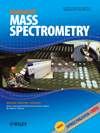
JOURNAL OF MASS SPECTROMETRY
Scope & Guideline
Pioneering Discoveries in Chemistry and Medicine
Introduction
Aims and Scopes
- Mass Spectrometry Methodology Development:
The journal emphasizes the development of new mass spectrometry methodologies, including novel ionization techniques, mass analyzers, and sample preparation methods. - Application of Mass Spectrometry in Biological Sciences:
A significant focus is placed on the application of mass spectrometry in biological research, particularly in proteomics, metabolomics, and the characterization of biomolecules. - Environmental and Food Safety Analysis:
Research related to the application of mass spectrometry for environmental monitoring and food safety analysis is also a core area, highlighting its role in detecting contaminants and toxins. - Pharmaceutical and Clinical Applications:
The journal publishes studies that involve the use of mass spectrometry for drug analysis, pharmacokinetics, and the development of bioanalytical methods for clinical applications. - Theoretical and Computational Studies in Mass Spectrometry:
There is a consistent focus on the theoretical aspects of mass spectrometry, including computational models and simulations that enhance the understanding of mass spectrometric behavior.
Trending and Emerging
- Metabolomics and Biomarker Discovery:
There is a rising trend in the application of mass spectrometry for metabolomics studies, particularly in the discovery of biomarkers for diseases such as cancer, which underscores its importance in personalized medicine. - Advanced Instrumentation and Technique Integration:
Recent papers highlight innovations in mass spectrometry instrumentation and the integration of techniques such as ion mobility spectrometry, which are becoming increasingly relevant for complex sample analysis. - Environmental Monitoring and Analysis:
Publications focusing on the use of mass spectrometry for environmental monitoring, including air quality and contaminant detection in food, are gaining traction, reflecting a growing concern for environmental health. - Teaching and Educational Methods in Mass Spectrometry:
There is an emerging interest in the pedagogical approaches to teaching mass spectrometry, as evidenced by recent publications aimed at improving educational practices and accessibility in this scientific field. - Drug Development and Pharmacokinetics:
Research concerning drug analysis and pharmacokinetic studies using mass spectrometry is becoming increasingly prominent, particularly in the context of new drug development and regulatory requirements.
Declining or Waning
- Basic Ion Chemistry Studies:
Research focused on fundamental ion chemistry and simplistic ionization methods has decreased, possibly due to the rise of more complex and advanced methodologies that have overshadowed basic studies. - Traditional Gas Chromatography Applications:
The frequency of traditional gas chromatography applications, particularly those not combined with mass spectrometry, appears to be waning as integrated methodologies become more prevalent. - Non-Mass Spectrometry Techniques:
There seems to be a reduction in studies solely based on techniques that do not incorporate mass spectrometry, as the field increasingly emphasizes the integration of mass spectrometry with other analytical techniques.
Similar Journals
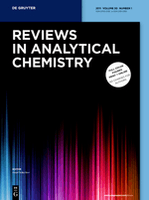
REVIEWS IN ANALYTICAL CHEMISTRY
Elevating Standards in Analytical Chemistry DiscourseREVIEWS IN ANALYTICAL CHEMISTRY, published by De Gruyter Poland Sp. z o.o., serves as a pivotal resource in the field of analytical chemistry, with a notable impact factor indicative of its scholarly significance. As an Open Access journal since 2020, it ensures widespread dissemination of high-quality research articles, facilitating knowledge sharing among researchers, professionals, and students alike. With its origins tracing back to 1980, the journal has adeptly adapted over the years to encompass emerging trends and innovations within analytical methodologies, maintaining its relevance and authority in the discipline. The journal is ranked in the Q2 category of analytical chemistry in 2023 and holds a commendable Scopus rank of #32 out of 156, reflecting its strong performance and the quality of the studies published. Researchers looking for cutting-edge reviews and insights will find this journal an invaluable platform for advancing their knowledge and research in analytical chemistry.
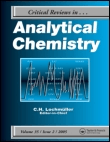
CRITICAL REVIEWS IN ANALYTICAL CHEMISTRY
Innovating Insights for Tomorrow's Analytical Challenges.Critical Reviews in Analytical Chemistry, published by Taylor & Francis Inc, stands as a pivotal journal in the field of analytical chemistry, contributing significantly to its advancement since its inception in 1989. With an impressive Q1 ranking in the 2023 analytical chemistry category, it positions itself among the top 15 journals in the field, reflecting its high impact and relevance, as evidenced by a 90th percentile Scopus rank. This esteemed journal is dedicated to publishing comprehensive reviews that synthesize current research and emerging methods in analytical techniques, making it an invaluable resource for researchers, professionals, and students alike. With the goal of fostering innovation and collaboration, Critical Reviews in Analytical Chemistry continues to address challenges and breakthroughs within the sphere of analytical methodologies, ensuring its authors and readers remain at the forefront of scientific discovery.
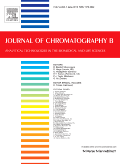
JOURNAL OF CHROMATOGRAPHY B-ANALYTICAL TECHNOLOGIES IN THE BIOMEDICAL AND LIFE SCIENCES
Transforming Biomedical Challenges through ChromatographyJOURNAL OF CHROMATOGRAPHY B-ANALYTICAL TECHNOLOGIES IN THE BIOMEDICAL AND LIFE SCIENCES, published by Elsevier, stands as a critical resource in the fields of analytical chemistry, biochemistry, and life sciences. With an impressive convergence of research spanning from 2002 to 2024, this journal delivers high-quality, peer-reviewed articles that advance the methodologies and practices related to chromatographic techniques and their applications in biomedical research. The journal enjoys a reputable standing in the academic community, reflected in its 2023 Scopus rankings—ranked in the 65th and 55th percentiles in Analytical Chemistry and Clinical Biochemistry, respectively. Although it does not offer open access, it provides a vital platform for exchanging innovative ideas and findings, guiding professionals and scholars in addressing the complexities of contemporary biomedical challenges. The journal’s focus on interdisciplinary research positions it as an essential tool for researchers, professionals, and students eager to enhance their knowledge and contribute to advancements in this dynamic field.
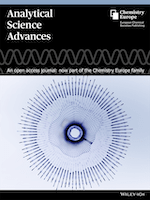
Analytical Science Advances
Leading the Charge in Analytical Method DevelopmentAnalytical Science Advances is a dynamic journal published by WILEY, dedicated to the ever-evolving field of analytical chemistry. With an ISSN of 2628-5452, this open-access platform aims to disseminate high-quality research and insightful reviews that push the boundaries of analytical methodologies and instrumentation. Since its inception in 2020, the journal has gained traction, securing a commendable Q2 ranking in 2023 within its category, highlighting its significance in the scientific community. Currently positioned at Rank #68 out of 156 in Scopus' analytical chemistry category, it boasts a 56th percentile ranking, reflecting its contributions to advancing analytical techniques. Researchers, professionals, and students will find this journal an invaluable resource for keeping abreast of the latest developments, emerging technologies, and innovative approaches in analytical science, ensuring the journal's relevancy and influence in shaping future discoveries.
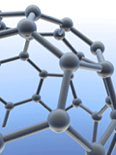
Annual Review of Analytical Chemistry
Transforming Knowledge into Analytical ExcellenceAnnual Review of Analytical Chemistry, published by Annual Reviews, is a premier journal that serves as a critical resource in the field of analytical chemistry, providing comprehensive and cutting-edge reviews that synthesize recent advancements and pivotal research findings. With an impressive impact factor and ranked Q1 in both Analytical Chemistry and Miscellaneous Medicine, it stands as a leader in disseminating knowledge that spans the intricacies of chemical analysis, enhancing the scientific discourse within the community. Available in both print (ISSN: 1936-1327) and online (E-ISSN: 1936-1335), the journal is accessible to a wide audience, fostering innovation and collaboration among researchers, professionals, and students alike. Its scope includes the converged years from 2008 to 2024, showcasing its commitment to providing relevant and timely insights that impact practice and education in analytical techniques, methodologies, and applications. The Scopus rank of #6 out of 156 in Analytical Chemistry, placing it in the 96th percentile, underscores its significance and the high regard in which it is held. As you explore the journal's offerings, you will find a wealth of knowledge that not only informs but inspires future discoveries in the realm of analytical chemistry.

MOLECULAR & CELLULAR PROTEOMICS
Unveiling the complexities of molecular biology.MOLECULAR & CELLULAR PROTEOMICS, published by Elsevier, stands as a premier journal in the fields of Biochemistry, Analytical Chemistry, and Molecular Biology, with a distinguished Q1 ranking reflecting its high impact and contribution to the scientific community. Established in 2002, this journal has consistently provided a platform for the latest research in protein science, merging molecular biology with advanced analytical techniques. With impressive Scopus rankings—41st in Biochemistry and 16th in Analytical Chemistry—it caters to an audience of researchers, professionals, and students eager to explore cutting-edge developments in proteomics. Although currently not designated as open access, the journal aims to foster knowledge dissemination through accessible research content. As it continues to evolve until 2024, MOLECULAR & CELLULAR PROTEOMICS is essential for anyone passionately engaged in the ever-expanding field of proteomics.
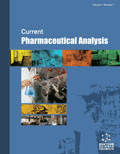
Current Pharmaceutical Analysis
Transforming Research into Real-World Pharmaceutical SolutionsCurrent Pharmaceutical Analysis, published by Bentham Science Publishers Ltd, is a vital resource for professionals and researchers in the fields of Pharmaceutical Science, Biochemistry, and Molecular Medicine. Established in 2006, this peer-reviewed journal aims to provide a platform for the latest advancements and analytical methodologies in pharmaceutical research and drug development. Over the years, it has garnered attention for its rigorous scrutiny and contributions to the landscape of pharmacology, evidenced by its quartile placements in various categories, most notably Q3 in Pharmaceutical Science. Despite its current rankings placing it in the lower quartile in several disciplines, the journal remains an essential venue for both emerging and established researchers seeking to disseminate their findings. With the widespread accessibility of its articles, researchers, professionals, and students can engage with cutting-edge studies to foster innovation in pharmaceutical analysis. For access to the latest research contributions, readers can explore the digital archive and stay updated on pivotal discussions shaping the future of the pharmaceutical sciences.

Journal of Mass Spectrometry and Advances in the Clinical Lab
Transforming Clinical Labs with Innovative Spectroscopy SolutionsJournal of Mass Spectrometry and Advances in the Clinical Lab, published by Elsevier, serves as a premier resource within the fields of clinical biochemistry, medical laboratory technology, microbiology, and spectroscopy. Launched in 2021 with an Open Access model, this journal enhances the accessibility of innovative research, making it an ideal platform for researchers, practitioners, and students alike. With an impressive impact factor reflected in its quartile rankings—Q2 in Clinical Biochemistry and Microbiology, and Q1 in Medical Laboratory Technology and Spectroscopy—this journal ensures high visibility and credibility. The journal's diverse indexing and significant standings in Scopus rankings highlight its commitment to advancing knowledge and fostering collaboration among professionals in laboratory sciences. Endorsed by a robust editorial board comprising leading experts, the journal aims to disseminate cutting-edge findings and methodologies, contributing to significant advancements in clinical and scientific laboratory practices. By bridging theoretical frameworks and practical applications, this journal plays a crucial role in the continuous evolution of laboratory technologies, thereby empowering readers to push the boundaries of research and innovation in their fields.

Proteomes, published by MDPI since 2013, is a notable open access journal that occupies a critical place in the realms of Biochemistry, Clinical Biochemistry, Molecular Biology, and Structural Biology. Based in Switzerland, this journal not only promotes the dissemination of high-quality research pertaining to protein structures and functions but also emphasizes interdisciplinary approaches that bridge various fields of biomedical science. With a Category Quartile ranking of Q2 across multiple pertinent categories in 2023, Proteomes boasts a competitive impact within the scientific community, evidenced by its robust Scopus rankings. Researchers, professionals, and students are invited to explore a wealth of pioneering studies and reviews that are made freely accessible, aligning with global trends in open scientific communication. Whether contributing original research or seeking to expand their knowledge, the journal serves as an invaluable resource for anyone engaged in the evolving landscape of proteomics.

EUROPEAN JOURNAL OF MASS SPECTROMETRY
Pioneering Research for Tomorrow's Scientific BreakthroughsEuropean Journal of Mass Spectrometry, published by SAGE Publications Ltd, is a premier academic journal dedicated to advancing the field of mass spectrometry and its applications in atomic, molecular physics, and medical sciences. With an ISSN of 1469-0667 and an E-ISSN of 1751-6838, this journal serves as a vital platform for disseminating innovative research findings and methodologies that enhance our understanding of complex molecular structures and interactions. Operating from the United Kingdom, it has established itself within the academia by achieving a Q3 ranking in several categories, including Atomic and Molecular Physics and Spectroscopy, as per the 2023 category quartiles. Researchers and professionals can access a diverse range of articles that not only address theoretical aspects but also practical applications in various scientific disciplines. As the field continues to evolve, the European Journal of Mass Spectrometry plays a crucial role in fostering collaboration and knowledge sharing among experts, making it an indispensable resource for anyone invested in mass spectrometry and its interdisciplinary connections.